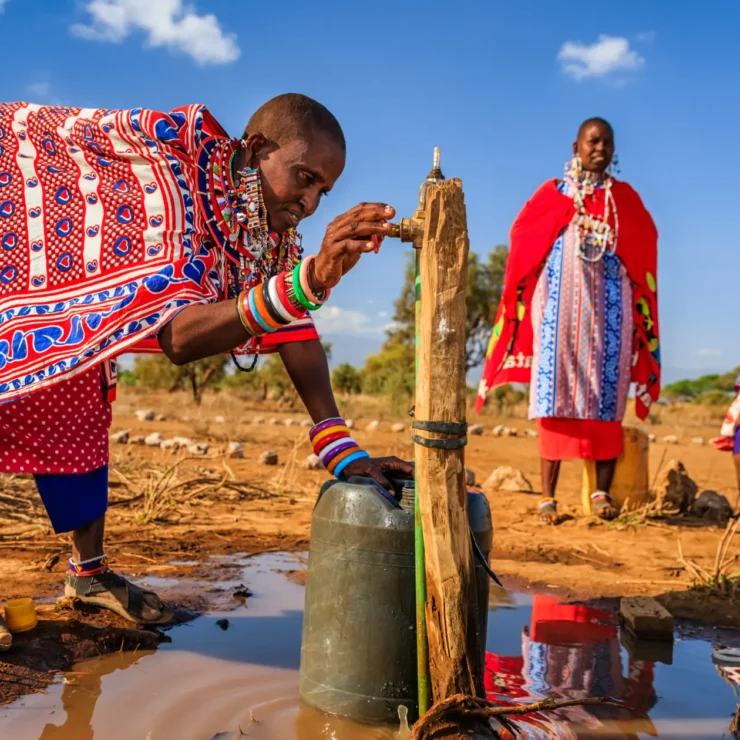Clean Water in Africa
For much of Africa, access to clean water remains a significant hurdle, with millions of people still lacking this fundamental resource. Many African nations struggle with water scarcity or poor water quality due to inadequate infrastructure, pollution, and a lack of investment. Bridging this gap is about more than quenching thirst; it’s a vital step toward unlocking economic potential. Improved water access offers communities the stability needed to thrive, leading to improved agriculture, health, and ultimately, economic growth.
Water: A Cornerstone of Human Development
In the realm of human development, water plays a vital role that cannot be overstated. It is not just a basic necessity for survival, but a key ingredient in the recipe for progress and prosperity. The link between access to clean water and overall human development is clear and undeniable. When water is scarce or contaminated, the ripple effects are numerous and severe. Food production suffers, as crops cannot be irrigated and livestock cannot be adequately hydrated. This leads to food shortages, malnutrition, and ultimately, worsening health conditions in the population.
On the other hand, when clean water is readily available, the benefits are manifold. People are healthier, as they are less prone to waterborne illnesses like diarrhea and cholera. This means they can work more productively, support their families, and contribute to the economy. Women, who are often the primary caregivers in households, can spend more time caring for their families or pursuing educational opportunities. Children, freed from the task of water collection, can attend school regularly and focus on their studies.
Ultimately, access to clean water is not just a matter of convenience, but a catalyst for positive change in communities. It enables individuals to break free from the cycle of poverty and deprivation, leading to sustainable development and a brighter future for all. As we strive towards achieving the Sustainable Development Goals, ensuring access to clean water for all should be a top priority.

Overcoming Economic Hurdles to Water Provision
In addition to creating jobs, investing in water infrastructure can also lead to a more efficient use of resources. By upgrading outdated systems and implementing new technologies, countries can reduce water losses due to leakages and increase the overall reliability of their water supply. This, in turn, can increase productivity in various sectors of the economy that depend on water, such as agriculture and manufacturing. Moreover, access to clean and reliable water is essential for public health and well-being.
By improving water systems, countries can reduce the prevalence of waterborne diseases and improve overall sanitation conditions, leading to a healthier population and lower healthcare costs. This, in turn, can free up resources that can be diverted towards other critical needs, such as education and infrastructure development. Overall, investing in water provision in Africa is not only important for addressing immediate challenges but also for unlocking long-term economic potential.
By addressing water service delivery issues and ensuring access to clean and reliable water for all, African countries can create a more resilient and sustainable future for their citizens. Through strategic investments and partnerships, these challenges can be overcome, leading to a brighter and more prosperous future for the continent.

Public Health and the Water Crisis
Additionally, the lack of clean water also has further-reaching implications beyond just public health. In regions where water scarcity is a problem, individuals, particularly women and children, are forced to spend hours each day collecting water from distant sources. This not only takes time away from other productive activities such as education or work, but it also perpetuates a cycle of poverty and inequality. Furthermore, the lack of access to clean water can also exacerbate conflicts over scarce resources.
In many parts of the world, water scarcity has been a contributing factor to political instability, displacement of populations, and even armed conflict. By addressing the issue of clean water access, countries can help to promote peace and stability within their borders. In conclusion, the issue of clean water access is not just a matter of public health, but also one that has far-reaching social, economic, and political implications. By investing in water infrastructure and promoting sustainable water management practices, countries can create healthier, more prosperous societies for all of their citizens.
Empowering Communities for Water Management
Involving the community in decision-making and implementation enables improved efficiency and sustainability of water services in their villages. In addition to providing clean and reliable water access, community-driven water management initiatives also have broader social and economic impacts. By empowering local communities to take charge of their water resources, these programs can create jobs, stimulate economic development, and foster a sense of pride and cooperation among residents.
Furthermore, by promoting water conservation and eco-friendly practices, communities can reduce their environmental impact and contribute to broader efforts to combat climate change. Overall, community-driven water management initiatives have the potential to transform water service delivery in Africa, ensuring that all residents have access to clean and sustainable water sources. By harnessing the knowledge, skills, and resources of local communities, these programs can create lasting change and improve the lives of countless individuals across the continent. As we continue to face the challenges of water scarcity and resource management, it is clear that community-driven approaches hold the key to a more sustainable and equitable future for all.

Water Infrastructure
The critical importance of robust water infrastructure cannot be overstated in ensuring the health, safety, and economic prosperity of communities around the globe. As the backbone of water delivery and sanitation systems, infrastructure that is modern, efficient, and resilient is essential to meet the growing demands of expanding populations and the strenuous challenges imposed by climate change. Aging pipelines, treatment plants, and sewer systems are increasingly vulnerable to breakdowns, leading to water disruptions, public health hazards, and costly repairs that underscore the urgency for improved water infrastructure.
Investment in upgrading these vital systems not only safeguards public health by maintaining consistent clean water supplies and effective waste management but also stimulates economic growth through job creation and enhanced reliability for industries that depend on water. Moreover, with technological advancements, there is the added potential to incorporate sustainable and smart solutions into our water infrastructure, reducing waste, conserving resources, and ensuring long-term viability.
Education as a Tool for Water Conservation
By incorporating water conservation education into school curriculums, students can learn early on about the necessity of preserving water resources for future generations. They can participate in hands-on activities and projects that showcase the impact of water usage on the environment and develop a sense of responsibility towards protecting this valuable natural resource. Furthermore, educating communities about water conservation can also lead to behavioral changes that reduce water consumption and promote more sustainable practices. By providing information on simple actions that can make a big difference, such as fixing leaky faucets, using water-saving appliances, and reducing outdoor watering, individuals can take steps to minimize their water usage and contribute to the overall conservation efforts.
In addition, teaching about the importance of water conservation can also raise awareness about the interconnectedness of water resources with other environmental issues, such as habitat destruction and climate change. By understanding the broader implications of water scarcity and pollution, communities can make more informed decisions about their water usage and support policies and initiatives that aim to protect and preserve water resources for the future. Overall, education plays a crucial role in empowering individuals and communities to take action in water conservation efforts. By raising awareness, providing information, and promoting sustainable practices, we can work together to ensure a more secure and sustainable water future for all.

The Economics of Water Distribution
One of the key ways in which improving water distribution infrastructure can have a positive impact on the economy is by reducing the cost of delivering clean water to households and businesses. In many developing countries, inefficient water distribution systems result in high levels of water loss due to leaks and theft, as well as high energy costs for pumping water over long distances. By investing in new technologies such as smart meters and leak detection systems, governments can improve the efficiency of their water distribution networks and reduce operating costs.
Equitable allocation of water resources is also crucial for economic development. In many regions, water scarcity and competition over limited water resources can lead to conflict between different user groups, such as farmers, industry, and urban consumers. By implementing transparent and fair water allocation systems, governments can help to reduce tensions and promote cooperation between different stakeholders. This in turn can create a more stable environment for businesses to operate in, and stimulate cross-border trade and investment. By investing in effective water distribution networks, governments can also create new opportunities for economic growth.
Improved access to clean water can help to boost agricultural productivity and support the development of new industries such as food processing and manufacturing. In addition, by providing reliable water supplies to urban areas, governments can attract new businesses and investors, who are more likely to set up operations in areas with secure access to essential resources. Overall, the economic implications of water distribution are vast and far-reaching. By making strategic investments in water infrastructure and management, governments can not only improve public health and environmental sustainability, but also create new opportunities for economic growth and regional stability.
Policy Recommendations for Water Governance
For sustainable water governance, policy recommendations include increasing investment in water infrastructure, promoting public-private partnerships, and enhancing regional cooperation. Governments should implement policies that encourage equitable water distribution, including tariff structures that ensure affordability while allowing for the recovery of service costs. Environmental regulations to protect water sources and investment in research and development for new water technologies should also be prioritized.
The ripple effect of clean water accessibility is a testament to the interconnectedness of health, education, and economic stability. In Africa, bridging the water access gap has the power to create a wave of economic growth, lifting communities and ultimately guiding nations towards a more prosperous future. Addressing this vital need is not just a matter of humanitarian concern, but a strategic investment in the continent’s development and security.
View more blogs Here





